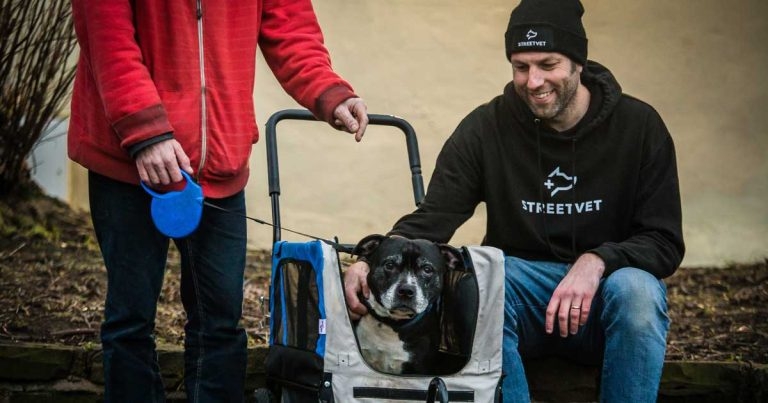5 Sept 2023
The world’s largest animal health company has pledged its support to StreetVet by providing free medical supplies and giving volunteer hours.

StreetVet Gloucester team lead Tim Sandys, with client.
Zoetis UK has announced an exclusive charity partnership with StreetVet in support of the organisation’s work.
StreetVet offers free veterinary care and services for the pets of those experiencing homelessness and is also the motivation behind the first National Human Animal Bond Awareness Day (23 July).
As a co-founder of the Human Animal Bond Research Institute (HABRI), Zoetis has pledged to support its work by donating medical supplies, while employees will be volunteering, facilitating fundraising activities and supporting CPD for the StreetVet volunteering team.
Oya Canbas, general manager at Zoetis UK, said: “The human animal bond is one of Zoetis’ driving passions, we recognise the power of pet companionship and the significant impact it can have on the well-being of owners.
“For animals that find themselves in circumstances where they are living on the street alongside their owners, it’s important that organisations step up and support both the pets and their humans to ensure we play a part in keeping these pets healthy and together with their owners.”
StreetVet clinical director and co-founder, Jade Statt added: “Homelessness is a growing problem in the UK and life on the streets or living in temporary accommodation makes it very difficult for people to access veterinary care for their animals.
“The majority of our clients had their pets from before they became homeless and they prioritise their well-being over their own. Zoetis’ support will be invaluable for StreetVet and we are so grateful to be their chosen charity.”
Zoetis recently partnered with HABRI to conduct a first-of-its-kind global quantitative study of 18,000 pet owners and 1,350 vets across four continents and nine countries.
The responses indicated that 88% of owners felt that having a pet had impacted their health (physically or mentally) in a positive way, this figure increased to 97% when the same question was derived in an indirect manner.